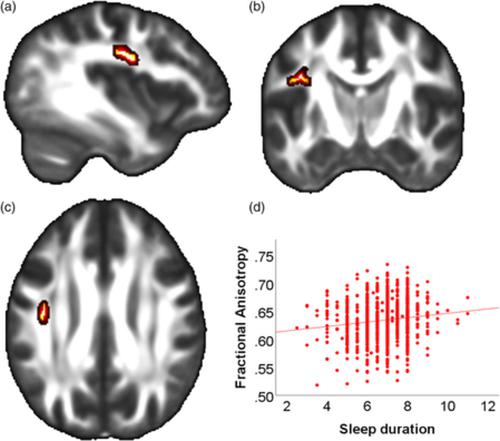当前位置:
X-MOL 学术
›
Hum. Brain Mapp.
›
论文详情
Our official English website, www.x-mol.net, welcomes your
feedback! (Note: you will need to create a separate account there.)
Sleep duration is associated with white matter microstructure and cognitive performance in healthy adults.
Human Brain Mapping ( IF 3.5 ) Pub Date : 2020-07-10 , DOI: 10.1002/hbm.25132 Pascal Grumbach 1 , Nils Opel 1 , Stella Martin 2 , Susanne Meinert 1 , Elisabeth J Leehr 1 , Ronny Redlich 1 , Verena Enneking 1 , Janik Goltermann 1 , Bernhard T Baune 1, 3, 4 , Udo Dannlowski 1 , Jonathan Repple 1
Human Brain Mapping ( IF 3.5 ) Pub Date : 2020-07-10 , DOI: 10.1002/hbm.25132 Pascal Grumbach 1 , Nils Opel 1 , Stella Martin 2 , Susanne Meinert 1 , Elisabeth J Leehr 1 , Ronny Redlich 1 , Verena Enneking 1 , Janik Goltermann 1 , Bernhard T Baune 1, 3, 4 , Udo Dannlowski 1 , Jonathan Repple 1
Affiliation

|
Reduced sleep duration and sleep deprivation have been associated with cognitive impairment as well as decreased white matter integrity as reported by experimental studies. However, it is largely unknown whether differences in sleep duration and sleep quality might affect microstructural white matter and cognition. Therefore, the present study aims to examine the cross‐sectional relationship between sleep duration, sleep quality, and cognitive performance in a naturalistic study design, by focusing on the association with white matter integrity in a large sample of healthy, young adults. To address this, 1,065 participants, taken from the publicly available sample of the Human Connectome Project, underwent diffusion tensor imaging. Moreover, broad cognitive performance measures (NIH Cognition Toolbox) and sleep duration and quality (Pittsburgh Sleep Quality Index) were assessed. The results revealed a significant positive association between sleep duration and overall cognitive performance. Shorter sleep duration significantly correlated with fractional anisotropy (FA) reductions in the left superior longitudinal fasciculus (SLF). In turn, FA in this tract was related to measures of cognitive performance and was shown to significantly mediate the association of sleep duration and cognition. For cognition only, associations shift to a negative association of sleep duration and cognition for participants sleeping more than 8 hr a day. Investigations into subjective sleep quality showed no such associations. The present study showed that real‐world differences in sleep duration, but not subjective sleep quality are related to cognitive performance measures and white matter integrity in the SLF in healthy, young adults.
中文翻译:

睡眠持续时间与健康成年人的白质微观结构和认知能力有关。
实验研究报告称,睡眠时间缩短和睡眠不足与认知障碍以及白质完整性下降有关。然而,睡眠时间和睡眠质量的差异是否会影响白质的微观结构和认知,目前尚不清楚。因此,本研究旨在通过自然主义研究设计来检查睡眠持续时间、睡眠质量和认知表现之间的横断面关系,重点关注大量健康年轻人样本中与白质完整性的关联。为了解决这个问题,从人类连接组项目公开样本中抽取的 1,065 名参与者接受了扩散张量成像。此外,还评估了广泛的认知表现测量(NIH 认知工具箱)以及睡眠持续时间和质量(匹兹堡睡眠质量指数)。结果显示睡眠持续时间与整体认知表现之间存在显着的正相关关系。较短的睡眠时间与左上纵束(SLF)各向异性分数(FA)的减少显着相关。反过来,该束中的 FA 与认知表现的测量相关,并且被证明可以显着介导睡眠持续时间和认知的关联。仅就认知而言,对于每天睡眠超过 8 小时的参与者,睡眠持续时间和认知之间的关联转变为负关联。对主观睡眠质量的调查显示没有这种关联。本研究表明,现实世界中睡眠持续时间的差异(而非主观睡眠质量)与健康年轻人的认知表现测量和 SLF 中的白质完整性有关。
更新日期:2020-07-10
中文翻译:

睡眠持续时间与健康成年人的白质微观结构和认知能力有关。
实验研究报告称,睡眠时间缩短和睡眠不足与认知障碍以及白质完整性下降有关。然而,睡眠时间和睡眠质量的差异是否会影响白质的微观结构和认知,目前尚不清楚。因此,本研究旨在通过自然主义研究设计来检查睡眠持续时间、睡眠质量和认知表现之间的横断面关系,重点关注大量健康年轻人样本中与白质完整性的关联。为了解决这个问题,从人类连接组项目公开样本中抽取的 1,065 名参与者接受了扩散张量成像。此外,还评估了广泛的认知表现测量(NIH 认知工具箱)以及睡眠持续时间和质量(匹兹堡睡眠质量指数)。结果显示睡眠持续时间与整体认知表现之间存在显着的正相关关系。较短的睡眠时间与左上纵束(SLF)各向异性分数(FA)的减少显着相关。反过来,该束中的 FA 与认知表现的测量相关,并且被证明可以显着介导睡眠持续时间和认知的关联。仅就认知而言,对于每天睡眠超过 8 小时的参与者,睡眠持续时间和认知之间的关联转变为负关联。对主观睡眠质量的调查显示没有这种关联。本研究表明,现实世界中睡眠持续时间的差异(而非主观睡眠质量)与健康年轻人的认知表现测量和 SLF 中的白质完整性有关。











































 京公网安备 11010802027423号
京公网安备 11010802027423号